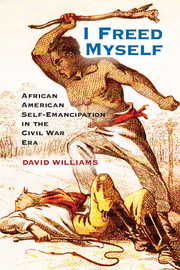2 - “Shedding the First Blood”
Forcing a War for Freedom
Published online by Cambridge University Press: 05 July 2014
Summary
The Enemy at Home
A few days before Confederates fired on Fort Sumter, the Richmond Dispatch assured white Virginians that there was no need to fear their slaves. “The southern negro has no sympathies with Northern abolitionists,” wrote the paper’s editor. Despite the looming threat of civil war, there was “perfect order and quiet among the servile classes.” Newspapers across the South sent the same illusory message. But that message did little to calm slaveholder fears or to mask the reality of slave resistance. In January 1861, South Carolina plantation mistress Keziah Brevard wrote of the slaves generally, “I cannot tell whether they have any good feelings for their owners or not.” By February, she had no doubt of her own slaves’ feelings. Despite her efforts to “make my negroes happy,” Brevard was “awakened to the fact that they hate me – My God – My God – what are we to expect from slaves – when mine hate me as they do – it is nothing on earth – but that I am white & own slaves.”
“We cannot sleep sound at nights for fear of the niggers,” said one slaveholder early in the war. “We are compelled to mount guard at nights … this is the only thing that keeps them in check.” In April 1861, Danville, Virginia, authorities required all white males who were not in the militia to serve on local slave patrols. That same month, a terrified resident of Tippah County, Mississippi, begged Governor John Pettus not to call for any more volunteers. Already blacks in the area had committed arson and attempted murder. “If there should be another call it will leave our women and children in this section exposed to the black insurgents.” A resident of Jefferson County made the same request. “Nothing but eternal vigilance will keep down the enemy at home,” as the writer called enslaved blacks.
- Type
- Chapter
- Information
- I Freed MyselfAfrican American Self-Emancipation in the Civil War Era, pp. 64 - 113Publisher: Cambridge University PressPrint publication year: 2014



